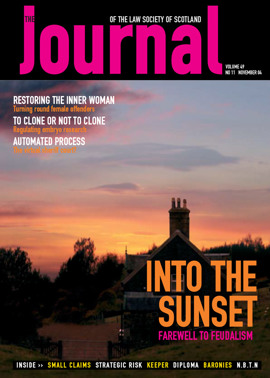Sharpen your pencils

Arrestment on the dependence
In Maguire v Itoh 2004 SLT (Sh Ct) 120 the issue was whether a warrant to arrest on the dependence should be granted. An interim decree had already been granted in favour of the pursuers and had been satisfied after the service of a charge. The pursuers argued that a prima facie case had been established and there was a need for an interim remedy, the defenders appearing to hold a closing down sale. Sheriff Cameron considered that there was no difference in the operation of the criteria between inhibition and arrestment. He did not consider that a warrant to arrest was required. There was no specific need for the remedy as the action was well advanced and a counterclaim was being insisted on.
When article 6 allows caution
In Cairns v Chief Constable, Strathclyde Police 2004 GWD 28-593 Sheriff Principal Bowen decided that when the pursuer’s pleadings were hopelessly irrelevant there was no breach of the pursuer’s rights under article 6 of the European Convention of Human Rights in ordering him to find caution for expenses. The sheriff principal followed the decision of Sheriff Principal McInnes in William Dow (Potatoes) Ltd v Dow 2001 SLT (Sh Ct) 37.
Decree by default following withdrawal
Failure to appear at inter alia a proof is a default in terms of OCR, rule 16.2. In terms of rule 24.2(1A) if an agent intimates by letter that he is no longer acting on behalf of a party less than 14 days prior to a diet as defined by rule 16.2(4), the sheriff does not require to assign a new peremptory diet in terms of rule 24.2(1) but can consider the matter at the previously fixed diet. What happens if an agent withdraws by letter within 14 days of a diet as defined by rule 16.2(4), the party fails to appear at that diet, a motion is made for decree by default in terms of rule 16.2 and the indication from the process is that the absent party is at very least not being diligent in representing his position? In Barrie v Alex Butter Landscaping Ltd, Perth Sheriff Court, 14 October 2004 Sheriff Principal Dunlop required to decide an appeal against a decree by default granted in those circumstances. The sheriff, in granting decree observed that, in addition to the party not being present, no productions or list of witnesses had been lodged, the pleadings had not changed to any degree since defences were lodged, notwithstanding substantial adjustment by the pursuer, and the defences were lacking in specification. Further the previous agent was in court to advise that the absent party was aware of the diet. In allowing the appeal the sheriff principal, agreeing with Sheriff Principal Kerr in Trad Hire and Sales Ltd v Campbell 2003 SLT (Sh Ct) 41, observed that the discretion given to a sheriff by rule 24.2(1A) was merely to preserve or discharge the previously assigned diet. If that diet is not discharged then at that diet the sheriff requires to consider whether the absent party intends to proceed with his action or defence. The sheriff has to be satisfied by some reliable means as to the intention of the absent party in regard to the future of the action. Whilst it was conceivable that the factors relied on by the sheriff might have been a reliable basis for concluding that the absent party no longer insisted on his defence, it was quite possible in such circumstances that any decree by default pronounced would be subject to successful review on appeal if the inference drawn by the sheriff turned out to be in fact incorrect or the interests of justice required the decree to be recalled. It does seem from this decision that it will be very difficult for decree by default to be granted if a party fails to appear at a diet after agents have withdrawn in terms of rule 24 within 14 days of that diet.
Value of written submissions?
The problems which can be caused by written submissions are noted by Sheriff Principal Young in Rennie v Norquoy 2004 GWD 31-648. Parties had been invited to lodge submissions by a certain date. The pursuer failed to do so and the case called when both parties were expected to expand their submissions. Neither party appeared on that date and the pursuer lodged submissions shortly thereafter without requesting to be further heard. In his observations at the appeal, the sheriff principal noted that difficulties often arose when written submissions were lodged but were not followed by an oral hearing. Any interlocutor making provision for written submissions should make it clear as to their extent and what opportunity would be allowed for subsequent oral submissions. For what it is worth, I have grave reservations about any matter being dealt with purely on the basis of written submissions. If parties desire to lodge written submissions then I consider it essential that parties are given the opportunity to be heard after the lodging of such submissions. The true benefits of written submissions in my view are, first, in these days of electronic mail written submissions can be transmitted to the presiding sheriff and as a result can be incorporated in full into a judgment! Secondly, if this opportunity is taken there should be no question arising in any appeal as to whether a matter was the subject of submission in the court below!
Judicial knowledge
The extent of judicial knowledge was raised in the appeal before Sheriff Principal Kerr in Kennedy v Kennedy 2004 SLT (Sh Ct) 102. The sheriff at first instance had taken into account that the defender’s pension would have reduced in value in the current economic climate. This observation was based on judicial knowledge. The sheriff principal accepted that it was known that pensions would have reduced in value at around the time of the decision; nonetheless it was not open for a court to take account of this when there had been no evidence led or submission made upon the point.
Re-entering a family process
In Robb v Gillan 2004 GWD 32-651 a minute was lodged by the defender, in an action for orders in terms of section 11 of the Children (Scotland) Act 1995, to re-enter the process after the action had been allowed to proceed as undefended six months previously as a result of her default. Sheriff Principal Dunlop refused the appeal against the decision refusing her application. He considered that she was no longer a party to the action. She could apply to the court by way of minute in terms of OCR, rule 33.63 in light of the subject matter of the action. That was not what the defender sought to achieve with her motion to re-enter the process and have defences ordered. If her application had been granted it would have had the effect of reviewing the previous interlocutor.
Interim ASBO criteria
In Glasgow Housing Association Ltd v O’Donnell 2004 GWD 29-604 Sheriff Holligan considered the criteria which required to be satisfied before an interim antisocial behaviour order should be granted. The grant of the order was discretionary. Reference to the word “satisfied” at an interim stage did not refer to a standard of proof, albeit in considering a final order, the standard had in England (in R v Manchester Crown Court [2003] 1 AC 787) been considered by the House of Lords to be the criminal standard. The court had to be satisfied at an interim stage that what was alleged amounted to antisocial conduct. Further the court had to be satisfied that the interim order was necessary to protect relevant persons from further antisocial acts or conduct by the person against whom the order was sought. Sheriff Holligan observed that the test was not that the order only prevented a party from doing what should not be done in the first place. The sheriff further observed that the summary application should contain the relevant averments. Reference to various witness statements in an accompanying inventory was an inappropriate way of presenting an application.
Effect of intervention orders
When a person was authorised to make decisions and give instructions on behalf of another as a result of an intervention order, Lord Mackay of Drumadoon decided in Riley v James Beaton and Co (Plumbers) Ltd 2004 GWD 31-635 that there was no need for the former to be convened as a party to an action in dependence. It would only increase expense. It was inappropriate to sist the authorised person as a party.
Taxing question of accounts
In Stronachs Corporate v Mount West 166 Ltd 2004 GWD 32- 664 Sheriff Principal Young, in granting an appeal against a requirement to have a solicitor’s account taxed, observed that it was unlikely that there had ever been a requirement to have such an account taxed before decree although it had been a well established practice. However paragraph 2.1 of the Act of Sederunt (Solicitor and Client Accounts in the Sheriff Court) 1992, and the use of the word “may”, allowed a sheriff to exercise discretion as to whether such taxation was required, the norm being that taxation was not required. If an action for payment of such an account was defended and the client wished the account taxed, such a requirement would only be dispensed with in exceptional circumstances such as the client waiving the right to taxation.
The usual caveat applies.
Postscript: Since the last article Cyma Petroleum (UK) Ltd v Total Logistics Concepts Ltd (September article) has been reported at 2004 SLT (Sh Ct) 112.
In this issue
- Drafting consumer contracts
- Virtual firms: transactional learning on the web
- Ignorantia juris: it's all Greek to me
- Sheriff Court Rules Council consultation paper
- The Clinical Trials Directive - a summary
- Guarding the inner sanctum
- Neighbours in the global village
- Family law: is it the path for you?
- From sunset to sunrise
- What next for conveyancing?
- An ethical minefield
- Shredding the evidence
- Robbing the poor?
- Our dynamic profession
- A wider angle
- Keep the eye on the ball
- A rough guide to becoming a partner
- Rediscovering hope
- Sharpen your pencils
- Significant other
- Too far or not enough?
- Chipping away the infringers?
- View from Holyrood
- Website reviews
- Book reviews
- The Registers and the Appointed Day
- Feudal law: not just a relic
- Birth of a register






